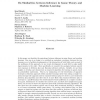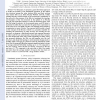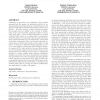50 search results - page 10 / 10 » Nash Convergence of Gradient Dynamics in General-Sum Games |
CSE
2009
IEEE
13 years 9 months ago
2009
IEEE
Social networks are the substrate upon which we make and evaluate many of our daily decisions: our costs and benefits depend on whether--or how many of, or which of--our friends ar...
JAIR
2008
13 years 5 months ago
2008
In this paper, we elucidate the equivalence between inference in game theory and machine learning. Our aim in so doing is to establish an equivalent vocabulary between the two dom...
ICC
2009
IEEE
13 years 12 months ago
2009
IEEE
— In this paper, we propose a game theoretical approach to tackle the problem of the distributed formation of the uplink tree structure among the relay stations (RSs) and their s...
JSAC
2007
13 years 5 months ago
2007
— One of the distinctive features in a wireless ad hoc network is lack of any central controller or single point of authority, in which each node/link then makes its own decision...
ATAL
2007
Springer
13 years 11 months ago
2007
Springer
Classically, an approach to the multiagent policy learning supposed that the agents, via interactions and/or by using preliminary knowledge about the reward functions of all playe...



